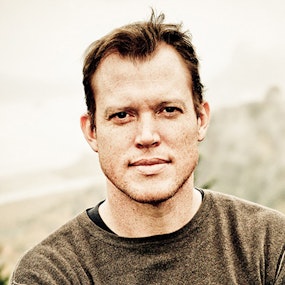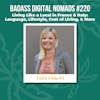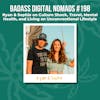Vagabonding with Rolf Potts (Interview from Paris, France)
One-of-a-kind interview with Rolf Potts in Paris, France, where he and Kristin talk about some of his biggest lessons and realizations from 25 years of globetrotting. Rolf Potts is the author of the book, Vagabonding.
Reminisce with us as we replay this one-of-a-kind interview with Rolf Potts in Paris, France during his Travel Writing Workshop, where he and Kristin talk about some of his biggest lessons and realizations from 25 years of globetrotting.
Rolf Potts is an American author, essayist, screenwriter, and long-term traveler who is known for his best-selling book, Vagabonding: An Uncommon Guide to the Art of Long-Term World Travel. Tim Ferriss has cited Vagabonding as the reason he decided to travel the world for a year in 2004-2005. As a result, Tim went on to write The Four-Hour Work Week. Iconic, right?
In this episode, Kristin and Rolf talk about what it’s really like to be a long-term world traveler while sharing their candid thoughts on why people are so resistant to being nomadic, even though it’s in our DNA. Rolf shares words of wisdom on the downfalls of modern society and consumerism, what it was like to be a nomad in the 90s, and why “time wealth” is such an important concept in the 21st century.
This conversation is unlike any conversation Kristin has had with a fellow traveler. Rolf’s top travel tips and life lessons are sure to make you want to pack your bags and hit the road!
EPISODE 111 TOPICS DISCUSSED:
- Expectations vs. Reality of travel.
- Rolf experience doing van life before #vanlife.
- The benefits of long-term travel and using your “time wealth” wisely.
- Why you may be afraid to get out of the rat race and travel earlier in life.
- The importance of constantly reassessing your motivations and desires in life.
- Why you should consider hiring a travel guide (no matter how well-traveled you are).
- How to avoid crowds and still have fun during the busy tourist season.
- What your bucket list should really be used for.
- Where Rolf’s inexpensive home base is located and what it’s like to come back home after traveling.
QUESTIONS ANSWERED:
- Why do humans have the innate desire to travel?
- With so much accessibility to travel and digital nomadism, why are people still resistant to it?
- Do you still fit in here in the U.S. after so many years of traveling abroad?
- Why should people travel slowly rather than having a busy itinerary?
- Do you consider yourself a lifetime traveler?
- What does the world not know about you?
- And much more!
RESOURCES
Featured Product: Remote Health Insurance by SafetyWing - International health insurance for expats, digital nomads, and remote workers (including US and Canadian citizens). Get 5% off your first year of Remote Health! Activate discount on checkout page.
Books:
- Vagabonding: An Uncommon Guide to the Art of Long-Term World Travel
- The 4-Hour Work Week by Tim Ferriss
- Tools of Titans by Tim Ferris
Podcasts:
Videos:
Connect with Rolf
- Visit his Website
- Sign up for his Writing Workshops
Connect with Kristin:
- Follow on Instagram
- Subscribe to Traveling with Kristin on YouTube
- Subscribe to Digital Nomad TV on YouTube
- Follow on Medium
- Follow on Clubhouse @KristinWilson
- Join the Badass Digital Nomads Facebook Group
...........................................................................................
Support the Badass Digital Nomads Podcast:
- Buy Me a Coffee
- Become a Patron
- Leave a 5* Review: https://lovethepodcast.com/digitalnomad
- Buy Official Merch
- Search All Episodes: www.badassdigitalnomads.com
Thank you to Mikael Mokale from Finland for leaving the following review:
Incredibly inspiring!
Whether you are or aren't planning to become a digital nomad, you should definitely give this podcast a listen. It gives an inspiring perspective of different life stories of interesting people in a really engaging way. You should also check out Kristin's "Traveling with Kristin" and "Digital Nomad TV" on Youtube and @travellingwithkristin on Instagram.
...........................................................................................
Thank you to my 2021 Patrons: Teklordz, Trader Walt, Shawn, Gary, Gary R, Yozhik, Bronwyn, Cynthia, Erick, Yasmine, Mike, Isaac, Michael, Scott, Karen, Erik, Heather, Craig, RZ, Timothy, Richard, Fred, Lakshay, Yohji, Annie, Ray, Ron, Henry, Kelly, Alejandra, Keith, Stephen, Eddy, Warren, James, Daniel, and Javier.
Become a Patron for $5/month at Patreon.com/travelingwithkristin
...........................................................................................
Podcast descriptions may contain affiliate links of products and services we use and recommend at no additional cost to you.
Introduction: Welcome to Badass Digital Nomads, where we're pushing the boundaries of remote work and travel, all while staying grounded with a little bit of old school philosophy, self-development, and business advice from our guests.
Kristin Wilson, Host: 00:00:18 Hi, everyone. Kristin from Traveling with Kristin here, and welcome to episode 111 of Badass Digital Nomads podcast. It feels like forever ago, but two years ago today, I was on my way to Paris, France to attend Rolf Potts summer travel writing workshop. And for today's episode, I wanted to take a trip down memory lane with you and share this replay of my interview with one of my favorite writers in the world and the person who inspired Tim Ferris to write the Four Hour Work Week. Most people do not know that way. More people know Tim Ferris and the Tim Ferris Show than know of Rolf Potts. But I want to change that for all of you listening today. Also, coincidentally in the News France where this episode was recorded is reopening to tourists for summer travel, and I've been doing a lot of Europe travel updates over on my YouTube channel Traveling with Kristin.
Kristin: 00:01:25 So make sure to check out those videos if you're interested on Travel to Europe this summer. But um, yeah, back to Rolf, why did I choose to replay this episode for you this week? Not just because it was two years ago that I was in Paris with him learning how to write and interviewing him for this podcast, but just the fact that this interview exists is so significant in so many ways. I read Rolf's book Vagabonding back in 2002 when I was living abroad for the first time in Costa Rica, and I actually carried that book around with me for so long. And years later, I think in 2005 or 2007, I think I had a picture of him on my vision board <laugh>, like, I don't know if it was like a printed out picture, I just have a flashback of having a photo of Rolf Potts or like a interview cut out from a magazine or something from him on my vision board, and to then be able to later on meet him in person and have him on my podcast, which podcast didn't even exist back then.
Kristin: 00:02:32 And then to be able to share that conversation with you today, how everything comes full circle, it's just this testament to the magic of life and the Butterfly Effect. And I think a reminder of how long things can take to come to fruition and manifest themselves in life, but then also the importance of the journey that it takes to get where you're going. Now, we all live in the modern day world where everything is moving so fast. Remembering the cliche of the journey being the destination is so important because this conversation with Rolf wouldn't exist without everything that came between 2002 when he decided to write his book. And today, I mean, Rolf traveled the world alone as a vagabond backpacker turned that experience into a book which inspired me to travel or I was already traveling, but it inspired me to keep traveling on my journey, inspired the Four Hour Work Week movement, and it resulted in these words that I am speaking to you right now, and Rolf is such a nice, genuine down to earth guy.
Kristin: 00:03:46 He agreed to sit for this interview when I had zero subscribers or listeners on YouTube or my podcast, and he did the same thing for Tim Ferris back in probably 2003 or 2004 when burnt out entrepreneur tech Silicon Valley, Tim Ferris decided to interview or reached out to Rolf to interview him for this idea for a book that he had called The Four Hour Work Week. And so it's so nice of Rolf to sit down with young people and students and people just starting out in their writing or entrepreneurial journeys. And so he is still the same guy today that he was 20 plus years ago. So just keep chipping away on whatever dream you're headed towards right now and remember that it might take a little while to get there, but enjoy that process of things unfolding along the way and, um, all of the different detours that you might take.
Kristin: 00:04:45 Which reminds me, Rolf has a podcast called Deviate. So you definitely wanna check that out because I think that pretty much sums it up. Deviate by Rolf Potts. If you're interested in becoming a writer or a blogger, I will link to his summer writing workshops and courses in the show notes where you can learn the craft of writing while living in Paris for a while, you know, living the dream. And, uh, Rolf also just told me in an email that he's working on a new travel book for 2022, so follow him on social media to learn more about that, and he's also newly engaged. So congrats Rolf, if you're listening to this. Lots to update since the last time we talked. And thank you to Mikhail Alii from Finland who left a review for Badass Digital Nomads in June of 2019. While I was headed to France to record this very interview, he said, incredibly inspiring.
Kristin: 00:05:42 Whether you are or aren't planning to become a digital nomad, you should definitely give this podcast a listen. It gives an inspiring perspective of different life stories of interesting people in a really engaging way. You should also check out Kristin's Traveling with Kristin and Digital Nomad TV on YouTube and Traveling with Kristin on Instagram. Thank you, Mikhail, if you are still out there listening, and thank you to everyone who has left a review to date or who tunes in each week to just hear new interviews and learn something new. I hope that the podcast is getting better and better with every new episode. And I look forward to seeing you all again next week. Enjoy this throwback interview with Rolf Potts, the author of Vagabonding.
Podcast Interview:
Rolf: 00:06:32 Even though I've traveled around the world, God knows how many times in those 25 years, sometimes I envy his good middle American family life. And that's, that's good to acknowledge that it's not a contest that people who live vagabonding lifestyle or are digital nomads, they're not winning a contest against somebody else. You're just trying to manifest a fuller version of yourself. And so for a long time, I really had no home.
Kristin: 00:06:59 After publishing his bestselling book, Vagabonding in 2002, Rolf Potts became known as the Jack Carro Act of the internet age. He's inspired countless people around the world, including Tim Ferriss, who credits Rolf's book as the inspiration behind his travels. Leading up to the Four Hour Work Week, I first learned about Rolf's work through Tim Ferriss's book in 2007, and these concepts have stayed with me ever since. Few people know, however, that every summer Rolf teaches a Paris writing workshop here in the city of light. And although I've never been able to attend before, I jumped at the chance to come to this year's first ever one week travel memoir writing course, and learn how to write about travel from one of my favorite authors in between writing and sightseeing. Rolf took the time to sit down with me the other day and talk with us about the motivation behind the original Vagabonding book and what he's learned after traveling around the world for more than 20 years. Let's see what he has to say. Hi guys. Welcome to another episode of Badass Digital Nomads. And today we are here with an OG Digital Nomad who was one before we were calling ourselves Digital Nomads, and this is Rolf Potts of Vagabonding fame. So if you guys have ever heard of the book Vagabonding or the Four Hour Work Week, here's the author <laugh>. So welcome Rolf.
Rolf: 00:08:36 Thank you. Good to be talking to you here in Paris, France.
Kristin: 00:08:39 Yes. So actually I am in Rolf's Travel memoir writing workshop, so that is why we're hanging out here in Paris today. And he was kind enough to come on the show and talk a little bit about, well, he's been traveling around the world for more than two decades now.
Rolf: 00:08:56 Yes, it's the 20th anniversary of my first big international vagabonding journey for me.
Kristin: 00:09:02 Time flies.
Rolf: 00:09:03 Time flies. It's been 25 years since my first vagabonding journey, if you count my van trip around North America in 1994, so.
Kristin: 00:09:10 Oh, Wow.
Rolf: 00:09:11 Yeah.
Kristin: 00:09:12 So you are doing Van Life before hashtag Van Life.
Rolf: 00:09:16 Totally. Yeah. You're good. I actually did a podcast, um, for my own podcast Deviate. I interviewed the friend that I took that trip with and, um, not only was it before hashtag, it was before anybody used the dial up internet, so it was totally OG Van Life and, and it was great. It, it was really a terrific trip for all the reasons people like hashtag Van Life
Kristin: 00:09:37 Yeah. Without being able to document it on social media, but it was probably a pure form of traveling back then.
Rolf: 00:09:45 It was. I was, I was reading my journals and I don't want to criticize the compulsion to put things on social media because if it existed back then, I probably would have. But there were just some really beautiful moments that I'm glad that just existed for me and my friends who shared them.
Kristin: 00:09:59 Yeah. Yeah. And what, were you in school at that time?
Rolf: 00:10:02 No, I had just graduated. Okay. I worked as a landscaper and this, I right about this in Vagabond, and I worked as a landscaper for eight months in Seattle. Saved my money. It's funny, I traveled America for eight months for $5,000 and lived in a van with, with, uh, a friend and various combinations of friends and just had this most amazing trip. And it's funny how I've been traveling the world for a long time now, but you can only travel the world when you're a 23 year old, 23 years old once. Yeah. So even though I've had more exotic travel since then, it's hard to compare to your first vagabonding trip. Just the great, the gratitude and the excitement is so strong. And I recently read my journal and it's just really amazing that even without Instagram or social media, I was really channeling my soul into that trip. And it was just terrific.
Kristin: 00:10:56 I would love, actually, I really wanted to ask you about, you wrote in Vagabonding that you thought that this was kind of a term that you stumbled upon through doing it and trying to define what it was that you were doing. Like what was this idea to just kind of travel perpetually and live that kind of nomadic lifestyle before there was a term to really describe it. So what do you think, uh, we also talked a little bit in the workshop about how you liked the Olympics and you, did you collect the Olympic flags or you drew the Olympic flags?
Rolf: 00:11:32 Yeah, well, I was taking home ec-class, I don't even know if they have still have home ec class. So I sewed the Olympic flags of all the European nations when I was about 13 years old. Such a nerdy thing to do, but, uh, it's great. I have 'em hanging on my wall now.
Kristin: 00:11:44 That's amazing. And see, I always, geography was my favorite subject in school, so I memorized the whole entire world map before I ever even had a passport. Right. So I was wondering what your thoughts are on this, like innate desire to travel because it's something that, uh, all humans share in common, even before we have the words to really define what it is and what it means. So where do you think after having circled the globe so many times, and of course we have the history of nomadic tribes and things like that, but why do you think that that desire is so strong even though your parents didn't travel that much or expose you to that aspect of the world?
Rolf: 00:12:26 I think it just is an innate curiosity and desire. Even if you don't end up traveling, you dream about other parts of the world. And I'm not sure, I'm not sure if it's hardwired, it might be hardwired into humans because we've been nomadic for more centuries in millennia than we haven't been. And so the idea that for years, you know, thousands of years ago to, to find opportunities and to enhance your life, you had to be on the move. You know, you had to be following the herds you were hunting or the seasons of the fruit trees or, or whatever. And so I think even though it's easy to look on childhood as this time of imagination, and it is, uh, I think there's a reason why as little kids, we dream about travel, we dream about wild animals, you know, we dream about growing up because it's, those are innate human instincts.
Kristin: 00:13:16 Yeah, I think so too. I think we're, we're hardwired for it for sure. So both you and I started traveling in the nineties and the early two thousands before, as we mentioned before, social media, before there was so much technology in Google Maps and making things easier. Um, do you feel like back then, like what was the kind of resistance that you were getting from people, from your friends, from your family members, and why do you think that people still struggle with taking this decision today? Because back then, even like a few decades ago, it wasn't generally accepted to be able to vagabond or travel and work remotely. And these weren't concepts that were mainstream and they still aren't quite mainstream today. But now there's your book, there's the Four Hour Work Week, there's so many travel books, and, um, with social media, there's so much documentation on how people can do it. So what do you think is still holding people back from that? And do you think that the same resistance that you came up on in the nineties and the two thousands, do you think that still exists today?
Rolf: 00:14:27 I think a version of it still exists. Uh, you know, a big thing in the nineties and even before the nineties of people I've talked to is just, it was seen as long-term travel was seen as this sort of dropout and be a rebel gesture. And one thing that the digital nomad movement and just sort of the ubiquity of the internet and our ability to see what other people are doing as travelers has eliminated the mystery and the, the counterculture vibe of long-term world travel. And yeah, there's nothing wrong with, with, uh, being rebellious or counter-cultural, but there is, as I say in vagabonding a real common sense motivation to this kind of travel. It doesn't need to be expensive, it doesn't need to be dangerous, it doesn't need to be strange or rebellious is just something that you can use to quietly enhance your life.
Rolf: 00:15:14 Yet I think that there are certain types of conservatism that can exist on both ends of the political spectrum, that there's this compulsion that somehow you're being irresponsible or dangerous or self-indulgent by traveling. And even, you know, there's some backlash against digital nomads just by saying, oh, those are just, you know, vacuous hipsters who are self-involved. Right. Well, it doesn't have to be that way. I'm sure you can find examples of digital nomads who are self-involved and self-indulgent. But at the end of the day, I still stand by the fact of what I wrote in Vagabonding before any of this happened, that it just makes sense. It's a common sense way of deepening your life in a way that can enhance your life throughout your life. And it need not be a silly or dangerous thing. You can live a life that's more dangerous at home, uh, than than on the road if you're not careful about it.
Rolf: 00:16:07 So practiced thoughtfully, long-term travel makes sense and is very doable, yet people through, through fear or certain compulsions or even certain, you know, I I'm, I'm sure that there's an argument that community is more cohesive when people are always in a place. My counter argument would be sometimes community needs people who leave and come back and say, this is what it's like on the other side of the world. So I'm probably the, the wrong person to ask for a counter argument to the digital nomad life, to the vagabonding life. And so I'm just gonna assert that it's still, the fears are still there, different iterations of the same fears are still there, but the reasons that make travel rewarding are still there too.
Kristin: 00:16:51 Yeah. You actually, I wrote, I took a few quotes from your book on that because I have seen them a few times. I think they were maybe in Tools of Titans as well where Tim Ferris was talking about that. And, um, you say, well, I paraphrased this one, but that long-term travel is an act of common sense within society, not rebellion. So what you just said, and that it has always been a private choice within a society that is constantly urging us to do otherwise. And I find that to be so conflicting because yeah, it is, it is a common sense choice and it is something that can be just a natural part of life and growing up and finding independence and uh, finding connection and common ground with other people around the world. But yet, even in almost 2020, it is still kind of seen as an act of rebellion and people still, uh, struggle with the perceived or real societal expectations of following a linear path to happiness or to adulthood or whatever that might be, which is always, you know, go to school, get a job, get married, have kids, save money, work hard, and then travel or relax at the end.
Kristin: 00:18:11 So why do you think that that myth is still perpetuated? I mean, it does work for some people, but we also know that the rat race can be a bit cyclical with no end in sight, just this infinite feedback loop that if you make it to the end, you can then have fun and go travel. So yeah. Why do you think that people are still afraid to step out of that generally accepted way of life and do the rebellious thing of like taking a sabbatical or gap year or whatever to travel younger?
Rolf: 00:18:46 Well, I think that linear way of thinking, there's a reason why we have a linear way of thinking because it, it creates stability, you know, that under some paradigms, being a flaky person who changes their mind about how to live every six months is not gonna live a very stable life. They're not gonna be good parents, they're not gonna be good employees. But I think sometimes we don't think holistically about what makes us happy and what the best course of action is. And I think one thing that I haven't mentioned that I probably should, that there, there's this idea of advertising. There's this idea of consume, consume, consume, buy, buy, buy more things will make you happy type thing. And that actually, that creates employment, I guess. But you don't have to buy into that. I think it's, it's not a healthy attitude that you can buy your happiness by having the newest brand of jeans or the newest kind of car or whatever.
Rolf: 00:19:39 And I think one argument against long-term travel is, oh, you have to be rich to do it. When that's not true at all, you just don't buy the goddamn jeans. Sorry if I'm sweating. Yeah, no. Um, you just don't buy the jeans. You don't buy the car. You actually spend money, not buy what is dictated by advertisers, but in your own self-interest, because why not just drive a normal ugly car and then spend six months on the other side of the world, then always have the newest car and impress half a dozen people who will forget about it the next week. And so I think there's this societal compulsion that is underscored by things like advertising that isn't very thoughtful. Um, and so I think one thing that underpins something like Vagabonding is the idea that really think about what you want in life. Think about how you wanna spend your time.
Rolf: 00:20:30 I talk a lot about time wealth, and some people say, well, some people don't wanna travel. And it's like, well, yeah, use your time well to spend time with your family or to spend time playing World of Warcraft or whatever makes you happy, you know, but we don't, we aren't often encouraged to be make ourselves rich in time that often we are encouraged to have the fanciest car or the fanciest jeans, when in fact, how we live our days is how we spend our time. And, um, so, so that's the secret. And it's different for everyone, but I really think that being thoughtful about how your life is lived is at the core of this argument. And it's the best counter argument against a lot of the antit travel attitudes that can come up.
Kristin: 00:21:11 Yeah, I think that's a really good point, is just making that whatever the decision is that makes you happy, just being confident in doing that, even if you don't get external validation or approval from any specific source, just being comfortable in that decision. Like, okay, that's right for me to do, so I'm gonna do it. Or I wanna work 20 hours a week so I can play video games and pick my kid up from school, or whatever the reason is. And like any reason is good, any reason is okay. And without being apologetic about it. So permission to act lawfully <laugh>.
Rolf: 00:21:47 Yeah. Well, one thing about time wealth too is that s sure, there's certain people who may judge you for having uncool jeans or the, the, not the best car in the world, but there is actually a community, an ever-growing community of people who do value time wealth, you know? Yeah. And those are the kinds of people that maybe you could turn to for validation instead of the, the consume, consume, consume, buy, buy by people, so.
Kristin: 00:22:10 Yeah. And how, um, after so many years and then kind of not caring what people think and traveling and coming back and forth to the us, how is it coming home or where do you see as your home now? Is it, is it the US or do you think that going back and forth has been a detriment because you kind of shooed that a normal American lifestyle? Do you feel like you still fit in?
Rolf: 00:22:40 You know, I fit in on my own terms and my life has been different. And I think everybody's, everybody's vagabonding lifestyle is different. You know, I traveled America 25 years ago with my friend Jeff, who's now married, works for Microsoft and has three kids. And sometimes even though I've traveled around the world, God knows how many times in those 25 years, sometimes I envy his good middle American family life. And that's, that's good to acknowledge that it's not a contest that people who live vagabonding lifestyle or, or digital nomads, they're not winning a contest against somebody else. You're just trying to manifest a fuller version of yourself. And so for a long time, I really had no home a, apart from occasional residency hotels and couches. Eventually 14 years ago, I got some land in Kansas, which is my home state. It's very near my family, who I'm close to.
Rolf: 00:23:30 And one thing I learned from travel is that family is a, is something that's valued everywhere. And then in places, even in, even especially in poor places, families will pool their resources to live, to help each other and live close together. So my neighbors, my next door neighbors are my parents and my sister and her family lives a mile and a half away. And I've, it's been fun to be a part of my nephew's life, uh, part of my parents' life when I'm not traveling. And so, and then also there's the advantage that Kansas is a super cheap place to live. You know, it's not a super sexy place to live, but it's an an expensive place to live. And my travel has really been enabled by the fact that I, not that I'm making millions of dollars every year, but I'm just spending money on what makes me happy in places that make me happy. And fortunately, my home is a place where one can live very simply and very inexpensively in a way that allows me to be more extravagant with my travels during other times of the year.
Kristin: 00:24:25 Yeah, I think that's another example of time wealth actually. Um, Tim Urban of that, Wait But Why blog talks a lot about how much time you have left with your friends, family, parents, siblings, when you get to be a certain age. So I know that's one of the things that I've taken advantage of being nomadic most of the time, is being able to spend big chunks of time near family. So that's a choice as well. And also that people don't have to be vagabonding forever. You know, they could do it for a few months, even if you did it for three months out of your life, that would be amazing. Like, that would be a life changing experience, even one, one month. So it's like being able to vagabond for more than just going on vacation and then coming back or going back and forth. I mean, do you see yourself as always like a lifetime traveler?
Rolf: 00:25:15 Yes, but that word, that phrase lifetime traveler is always changing. So 20 years ago, it meant that I didn't come back to the United States at all for a year these days it means that maybe I'm traveling half the year and some years I travel less than half the year. Sometimes I travel more than half the year. But it just becomes a dynamic part of my identity. Again, there's sometimes this zero sum thinking that's like, well, I traveled 10 months a year, and it's like, well, good for you. But some years I don't feel like traveling 10 months a year. And I have different interests and pursuits and relationships that dictate my decisions. It's not some arbitrary contest to win the game of travel, because once you start seeing travel as a contest, you've lost the point because it's about life enhancement. And I think the more you travel, the more you learn things, you get older, you have a different relationship with family and friends. And so I think it's good to start by being thoughtful and remain being thoughtful. Because again, once you are being beholden to external pressures, oh, I need to be a super traveler. Well do you, you know, or do you want to live close to your family a few months a year? Or you wanna indulge certain hobbies a certain time of year? So I think constantly reassessing your motivations and knowing that life changes as you get older and that change is inevitable is good to keep in mind.
Kristin: 00:26:39 I wanna give, before we run out of time, just a few quick, uh, I guess lightning round sort of questions to fit in for some people who, uh, are only able to travel occasionally, maybe like once a year or twice a year both of us are huge proponents of slow travel. So in a time of travel hacks and shortcuts, why should people take the slow route, even if they're just going on vacation for one week or two weeks? Can you just speak to the difference in doing the sightseeing circle versus having a smaller itinerary but going slower?
Rolf: 00:27:18 Well, one special thing about travel is that it's, you're away from home. And I think sometimes this micromanaged do 20 things in one day attitude. It's how we, we are at work. It's how we optimize for efficiency at home. And part of the joy of travel is that you're not at home. You're not beholden to any of that. That you can go to a place and smell it and live slowly and let the day happen and watch the sunset. And I think there's nothing wrong with optimizing your vacation for efficiency and checking 20 things off your list, but I think it's just gonna be more memorable. Apart from your bucket list comparisons, it's gonna be more memorable and more life affecting if you travel in a way that is different from how you live at home. If you enjoy days, if you, if you just walk around a city and see what interests you, rather than checking things off of a list.
Rolf: 00:28:09 Um, because for better or for worse, a lot of list driven tourism is an extension of how we live at home. And then suddenly we're taking selfies in front of this place and, and we're sort of performing our travels for the audience back home. We're not really thinking about what makes us happy and, and what will really make us experience a place on our own terms. So I think using the five senses, taking things slow, um, being a little lazy sometimes being counterintuitive and just walking until your day becomes interesting are, are great things to keep in mind as really great options when you're traveling.
Kristin: 00:28:43 I completely agree. And I have memories of like, traveling with my parents and going so many places so fast that we skipped meals. And I would have to call mutiny at some point and just say, I'm gonna sit on this hill and people watch for a few hours and you guys go to 13 more churches in the next hour and I'll just wait till you're done, so.
Rolf: 00:29:04 <laugh> Yeah. And, and, and not to disparage the people who wanna see 13 churches, but sometimes it's nice to sit on a hill and, and watch the world go by, you know? Yeah. That's, that's a, that's an important part of human experience too, and we free at that sometimes.
Kristin: 00:29:18 And also people feel like once they, um, like to travel authentically that they can't have a tour guide or, you know, they have to do everything on their own. So can you also speak to how even after traveling for decades, how you might still hire a guide to see a new place and why that's important and why that gives you an extra layer of, of perspective on that location?
Rolf: 00:29:41 Yeah. Well, it gives you a variety and a new kind of knowledge and it helps you understand even how people who travel with guides all the time travel. I mean, I think sometimes people say, well, I'd, I'd never go to the Eiffel Tower in Paris. 'cause that's where the tourists go. Well, just imagine how many people, maybe they're in their sixties and it's their first time in France and this is the most amazing day of their life, and you're being snotty because you've already been to Paris and you've already seen the Eiffel Tower. So I think you have to keep in mind that it's not a hierarchical thing. And I'm, I personally believe that traveling without a guide is often more rewarding. But for example, we're here for a writing class and I hired one of my former students who's a tour guide in Paris to take us around on Friday because I think that'll be a new perspective.
Rolf: 00:30:24 He has a skillset and a bunch of knowledge in his own sort of charming charisma that's gonna make that day special for us. This winter, I was in Sumatra, I went to the Mentawai Islands and I hired a trekking guide 'cause I don't speak Mentawai. You know, you have to slog through the jungle. And he was the most amazing guy I met in Sumatra. He just was very westernized. He spoke good English, but he was also completely into the Mentawai culture. And he was a Mentawai person who just happened to be modern. And my experience of that sort of semi stone age tribal culture on the Mentawai Islands wouldn't have even touched what had happened if I'd tried to go on my own. You know? So sometimes the expertise that a guide can bring you and just the personal passion that a guide can bring you, can really make a difference.
Kristin: 00:31:12 I mean, I'm gonna take that tip because I think at a certain point I just became very self-sufficient, and I thought I'll figure it out on my own. But now I have a different perspective too. And I really like what you said, that the expectation of the destination robs it, of authenticity. And I think anyone can be become guilty of that and just assume that because we've seen a cliche about a place or a stereotype about a place that we know what we're gonna get once we get there.
Rolf: 00:31:40 Yeah. And sometimes you think, well, damnit, I came all the way to Sumatra and here's a guy wearing blue jeans and talking on a cell phone. It's like, well, why isn't that a, uh, authentic thing too? You know, the world is in fluxx and our, our understanding of authenticity is, is so limited until we actually travel and realize that it's not just postcard, vistas and beauty. You know, as I said in class that sometimes you're in an Notre Dame and the first thing you smell is cat pee. Right. <laugh>. Well, that's, that's authentic too, you know? Yeah. That everywhere we go, there's going to be a mix of exactly what we dreamed about and exactly the opposite of what we dreamed about. But that's what we experienced and that's the gift of travel is getting these surprises that sometimes go beyond your platonic ideal of what you thought the place would be. Yeah.
Kristin: 00:32:24 I've definitely had some expectations, uh, crushed a few times. Yeah. Um, Santorini just being there even during the shoulder season, and I ha having seen all the photos of the Yeah. Panoramic vistas with the no people, and then being crunched into the alleys with selfie sticks and getting elbowed in the head. And I know you had a photo of a, the inside of Versailles with a lot of people, and it's like being able to go to those tourist destinations, but also straying off the beaten path and kind of managing that, because I just saw a quote about, or some stats about, uh, King's Landing in Croatia that because of Game of Thrones, it's such a popular destination that the max capacity is 8,000 people, and they had up to like 135,000 people allegedly in the same time. And then we also discussed how, uh, Koh Pi Pi Le, the beach was closed due to over tourism. So any tips for, for people who wanna get off the beaten path?
Rolf: 00:33:31 Well, we live, when I first started traveling, there wasn't a concept of a bucket list. I mean, there was an equivalent concept of a bucket list, but now that's a thing, and I don't have a problem with bucket lists, but you have to remember the bucket list is what gets you out the door. Because when you show up at the bucket list place like Versailles, like Machu Picchu, like Dubrovnik from Game of Thrones, it's gonna be full of a bunch of people who are exactly like you, who are, who are just there to check it off their bucket list and are pissed off because you're there. Right. And so I think it's good to remember that walk 10 minutes in any direction from a bucket list destination, you're gonna find a more air quotes authentic version of what you had hoped to find. And that includes here in Paris.
Rolf: 00:34:10 But it also includes, you know, like the movie of the beach made Maya Beach in Koh Pi Pi Le over tourist. So had to close it. But I was in Sumatra this winter, which used to be a part of the backpacker trail and has somehow fallen off the backpacker trail. And so there's an iteration of the beach in other beaches nearby. It's just nobody's going there because they're not on their bucket list because why? 'cause they don't know about them yet. So the bucket list should get you out the door once they're on the road, be willing to throw away those famous places and go to a place that is more amazing than you could have dreamt about when you woke up in the morning at home.
Kristin: 00:34:44 I agree. Sometimes life is more creative than we are when it comes to the most amazing destination.
Rolf: 00:34:50 And its best life is more creative than we are. Yeah. That's the joy of life is that it, it exceeds our expectations if we let it.
Kristin: 00:34:57 Yeah. Well, okay, one more question before I let you go. We, uh, we, the world, anyone who's read any of your writing and any of your books, associates you with, with travel, and I'm sure you do as well. I mean, all of us who have traveled a lot, we, it's a part of our identity and like who we are. But I'm just curious if you could share with us something that people don't know about you because Rolf and Travel, or Rolf and Tim Ferris and these things kind of go together. And when you're not traveling or writing, what is like your personal life like, or what are some of the other things that you like to do that aren't part of your public persona?
Rolf: 00:35:37 Well, it's funny, um, like, I like sports. I, I've always watched sports my whole life. And in fact, when I sewed those international flags, it was because of the Olympics. But my favorite team is the Can baseball team is the Kansas City Royals. And a few years ago they got really good. And so I started posting baseball stuff on my Facebook feed and people got kind of mad. It's like, we don't want baseball stuff. What? Where's your travel stuff? And it's like, Hey, I have a, I have a life that goes beyond travel, right? So screenwriting is something that really interests me. I actually wrote a screenplay about baseball a few years ago that has, you know, it hasn't been produced, but it's been fairly successful in that unproduced way. I spend a lot of time with my family in, in very simple ways that everybody spends with their family.
Rolf: 00:36:20 I've, I've been a part of my nephew's life, of course, I give them travel presence, um, when I can. Uh, and I think if you listen to my podcast, Deviate with Rolf Potts, the reason I called it Deviate is sort of maybe through midlife crisis, uh, energy. I just wanted an excuse to talk about anything else, right? So I talk a lot about travel on my podcast, but I also talk about satanic backward masking and rock and roll and end of life, quality of life and sustainable agriculture and, um, the joys of philosophy. And so I think as travelers, we are all just curious in the world, there's a meta level of being excited about travel, but one joy of travel is it allows you to be a generalist. It allows you to be interested in passionate about everything. And so, um, yeah, how many hours did you have? We could talk about everything that I get excited about from sports to family, to, to movies, and that's part of the point, you know, yeah. That I like talking about travel, but I also like a lot of, a lot of other things. And my happiness is from the multiplicity.
Kristin: 00:37:26 So everybody out there, thank you for watching and listening to this episode of Badass Digital Nomads with one of the original lifestyle designers, the Vagabonding, Rolf Potts. And remember that Rolf is more than a traveler, <laugh>, he also likes baseball and many other things. So I hope that this podcast has inspired you guys to integrate travel more into your life, and think about ways that you can do that long-term without changing who you are. Just make it more of an extension of your own individuality. So thank you guys for watching and see you next week on Badass Digital Nomads.

Rolf Potts
Author & Travel Writer
Rolf Potts is an American author, essayist, screenwriter, and long-term traveler who is known for his best-selling book, Vagabonding: An Uncommon Guide to the Art of Long-Term World Travel.































































